No matter what form it's provided in, all women's healthcare is created equal — right? A new study shows that, actually, "one-stop" health care clinics lower unplanned pregnancy rates, and that combining family planning services along with other sexual health services yields fewer unplanned pregnancies overall. Rather than relying on referrals for different aspects of women's health, which require multiple appointments and medical centers, it seems that keeping things in-house leads to more desirable results.
The study in question, entitled "Integration of family planning services into HIV care clinics," analyzed a wide range of patients in Kenyan clinics over two years, BuzzFeed reported on Thursday. One year out, the results concluded that providing family planning services in addition to HIV services showed as much as 30 percent lower pregnancy rates; Essentially, women who first went into the clinic seeking HIV-related care were also provided family planning services during their appointment, which led to fewer pregnancies overall.
Though this isn't the first study suggesting that family planning and HIV services should be provided together, the data gathered this time around is especially cohesive. Researchers were able to see that "the prevalence of more effective contraceptive methods was sustained" over time — that is, the use of "hormonal and permanent methods, and intrauterine devices," rather than condoms alone, held steadfast.
In discussing the intent of the study, lead author Dr. Craig Cohen stated, "This work comes from a place that women have a right to determine their reproductive health choices around if and when they want to get pregnant, and we should support them." He was also sure to stress that contraception wasn't the only goal, mentioning that "women who have some infertility [challenges] — we should be helping those individuals, when they want to, to get pregnant as well."
These findings emerge in a climate where funding for women's health services are being retracted on a global scale, in part due to the Trump administration's recent "stripping [of] U.S. family planning funds from groups involved with abortion," both at home and abroad. Under these provisions, all organizations involved with any heath effort (such as fighting HIV, treating malaria) will lose all U.S. funding if their practice "involves so much as an abortion referral," Slate acknowledged recently. For women living in nations with already restricted health resources, this could be devastating.
Rather than segmenting women's healthcare into procedure or ailment-specific offices, the conclusions offered by this study advise an integrated approach instead. Thus, legislation working to separate some services out, threatening to pull funding completely if providers don't comply, acts in no one's best interest, least of all the women in need of support and care. "One-stop shop" clinics encourage education, knowledge, and conscious family planning choices — practices that should be celebrated, and not suppressed.
